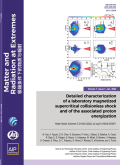首页|期刊导航|Matter and Radiation at Extremes|Growth of ablative Rayleigh-Taylor instability induced by time-varying heat-flux perturbation
Matter and Radiation at Extremes2024,Vol.9Issue(1):P.85-93,9.DOI:10.1063/5.0157344
Growth of ablative Rayleigh-Taylor instability induced by time-varying heat-flux perturbation
摘要
关键词
perturbation/stationary/acceleration分类
能源科技引用本文复制引用
Yang Liu,De-Hua Zhang,Jing-Fei Xin,Yudong Pu,Jun Li,Tao Tao,Dejun Sun,Rui Yan,Jian Zheng..Growth of ablative Rayleigh-Taylor instability induced by time-varying heat-flux perturbation[J].Matter and Radiation at Extremes,2024,9(1):P.85-93,9.基金项目
supported by the Strategic Priority Research Program of the Chinese Academy of Sciences(Grant Nos.XDA25050400 and XDA25010200) (Grant Nos.XDA25050400 and XDA25010200)
the National Natural Science Foundation of China(Grant No.12175229 and 12388101) (Grant No.12175229 and 12388101)
the Frontier Scientific Research Program of the Deep Space Exploration Laboratory(Grant No.2022-QYKYJH-HXYF-019) (Grant No.2022-QYKYJH-HXYF-019)
by the Fundamental Research Funds for the Central Universities. ()

